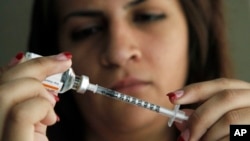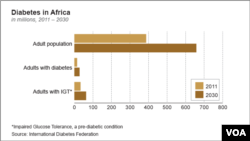The World Health Organization reports 422 million adults are living with diabetes, a four-fold increase over 1980 figures.
The release of this report in advance of World Health Day (April 7) is meant as a call to global action to halt the rise of type 2 diabetes, which is killing 1.5 million people a year. The World Health Organization estimates 43 percent of these deaths occur prematurely, before the age of 70.
The U.N. agency says diabetes is no longer a disease of the wealthy. Most cases now are found in middle- and low-income countries. The WHO says the highest rates are in the Middle East, Southeast Asia and the western Pacific.
The WHO report says the dramatic rise of this deadly disease is largely due to the increasing number of overweight and obese people. It reports more than one in three adults is overweight and more than one in 10 is obese.
Complications from diabetes
Etienne Krug, director of WHO's Department for Management of Noncommunicable Diseases, says diabetics will suffer complications from the disease if it is not detected in a timely manner and treated.
“People with diabetes have a two to three times higher risk of cardiovascular disease," said Krug. "They have a 10 to 20 times higher risk of lower limb amputation. Diabetes is an important cause of blindness ...and an important cause of end stage renal disease.”
Krug tells VOA the economic cost of diabetes can be catastrophic for both the individual and society. He notes that monthly insulin treatment, which is a question of life and death for many patients, can be expensive.
“We know that just the annual direct medical costs exceed $827 billion every year," said Krug. "It is a very, very vast, large number and that is not taking into account many other types of costs such as lost productivity, etc., etc…”
Promoting healthy eating habits
The U.N. agency says adopting a healthy lifestyle can prevent the majority of cases. The report’s recommendations include eating healthier, engaging in more physical activity and avoiding excessive weight gain.













